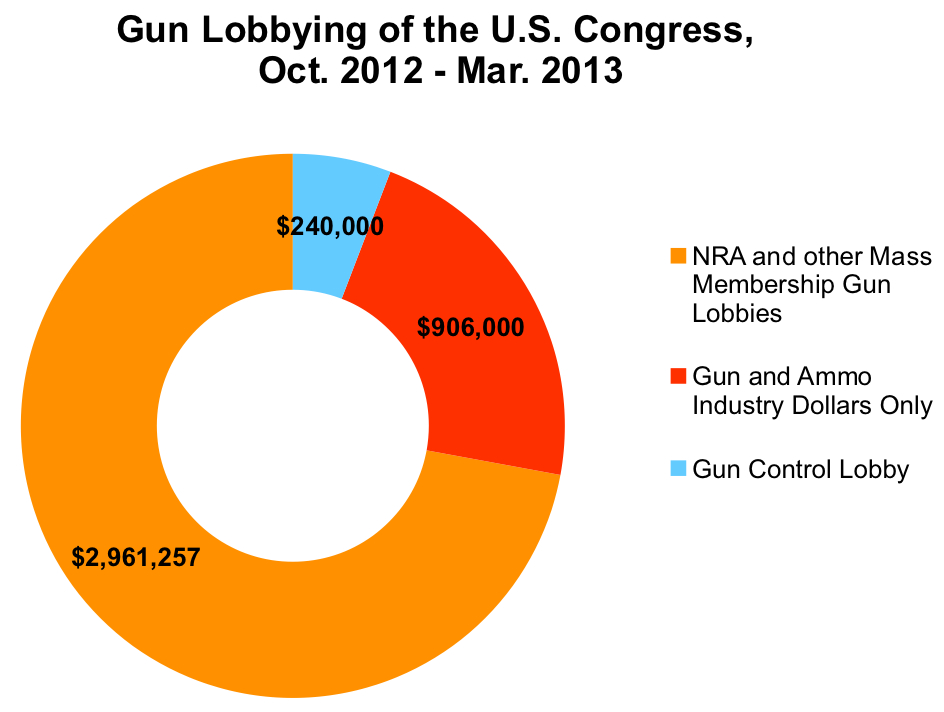
The defeat of the Senate’s gun bill last week reflects the strength of the NRA and other pro-gun membership organizations. But it also reflects the potency of a less examined political force: the gun industry. Senators who scuttled the most ambitious gun regulation bill in decades weren’t just representing their constituents. They were also protecting the economic interests of gun and ammunition manufacturers.
Here’s the connection no one is making: The defeat of the overwhelmingly popular universal background check proposal and the renewed assault-weapons ban has less to do with the cultural divide between red and blue states than it does with one simple fact — such laws would reduce gun sales and eat into gun makers’ profits.
And the gun makers saw this coming.
They knew that momentum for dramatic gun-control reform had been building since last year’s mass shooting in Aurora, Colorado, and they knew that momentum came to a head in the December with the Newtown massacre of 20 “beautiful little children.” According to disclosure records, gun makers embarked on a flurry of lobbying activity over the same period of time to push back against the rising tide of gun control.
| The gun debate has been framed as sensible Americans in favor of sensible gun-control laws versus whackjob members of the NRA. Gun makers are fine with that. |
The NRA as decoy
Pro-gun organizations massively out-spent gun-control groups before last week’s Senate vote. The NRA, Gun Owners of America, and the Citizens Committee for the Right to Keep and Bear Arms, along with corporate gun and ammo makers, buried gun-control advocates under $3.8 million in lobbying services.
Gun control groups mustered just $240,000. Pro-gun groups outspent gun-control organizations 16 to 1.
This is keeping with the overall history of gun law lobbying.
For decades, pro-gun organizations have had a considerable cash advantage over gun-control advocates. It won’t come as any surprise that a lot of that lobbying money has come from NRA members and similar mass membership groups that collect contributions from thousands of dues-paying supporters.
What is surprising, however, is this: If you strip away money spent by the NRA and other groups, you find that the firearm industry’s still had far more resources than gun-control groups thanks its influence in Congress. In other words, the gun debate has thus far been framed as sensible Americans in favor of sensible gun-control laws versus the gun-toting whackjob members of the NRA. And gun makers are fine with that.
The gun industry alone spent $906,000 on lobbying since October, a sum nearly four times the amount spent by gun-control organizations. The industry’s expenditures would have been enough to swamp gun-control advocates even without the NRA’s muscle. Who are these gun makers? They are: Colt, Sig Sauer, Remington, and Advanced Armament (all makers of assault rifles) as well as ammunition makers Olin and Alliant Techsystems, along with the main industry trade association, the National Shooting Sports Foundation.
Remington, Olin and Alliant
Remington’s disclosure filings over the past six months reveal efforts to win Defense Department contracts as well as its hiring of lobbyists to “monitor legislation concerning assault weapons and background checks.” Remington is a leading maker of AR-15 rifles and other “military-style” assault weapon models. It is owned by the Freedom Group, the largest gun manufacturing conglomerate in the U.S.
Freedom Group’s other brands include Bushmaster (the gun used by Adam Lanza in Newtown) and DPMS, both of which build and sell thousands of assault rifles each year. Assault rifles are one of the most profitable products for firearms makers. They advertise the guns as “tactical” and emphasize their military specs.
The main customers for these weapons are white men who live in rural regions, the South, Midwest, and mountain states. Some states like California currently ban assault rifles, but their legality in other states ensures that many can easily slip in and be sold in the black market.
Remington is the leading gun maker pressing for a law that would exclude lead ammunition from the Toxic Substances Control Act. Olin and Alliant Techsystems are interested in this effort too as ammo makers. They have a big stake in keeping the assault weapons legal, because the ammunition companies sell millions of .223 caliber bullets annually.
Colt, Sig Sauer, and Advanced Armament
Colt, Sig Sauer, and Advanced Armament are also among the top manufacturers of assault weapons. In February, Colt hired former U.S. Army Major General Randall West to lobby Congress for Pentagon small arms contracts. Because Colt also makes a good bit of profit by selling these guns to the public, West’s job also involves pressuring lawmakers to reject a new assault weapons ban. Sig Sauer and Advanced Armament have also deployed similarly influential ex-government and military officials over the past six months to seek Pentagon contracts, according to Senate disclosure records.
National Shooting Sports Foundation
All four of the above arms makers — Remington, Colt, Sig Sauer and Advanced Armament — are affiliated with the National Shooting Sports Foundation. Each contributes funds toward the NSSF’s various programs, including lobbying operations. The NSSF has emerged over the last decade as a potent lobbyist.
| The gun industry’s lobbying expenditures would have been enough to swamp gun-control advocates even without the NRA’s muscle. |
The NSSF spent $450,000 on lobbying over the last six months, $210,000 more than all of the gun-control advocates combined. Since January, the NSSF lined up nearly all Senate Republicans, and a few strategic Democrats, to defeat background checks, magazine limits, and the assault-weapons ban renewal.
After the Senate’s vote, the NSSF applauded defeat of the measures, stating that the proposals “would have impacted the firearms and ammunition industry and our Second Amendment rights.” The NSSF thanked its “allies in the Senate” for the demise of the assault weapons ban and magazine capacity limits.
The NSSF is headquartered in Newton, Connecticut, where the Sandy Hook Massacre took place. NSSF’s home base is due to the gun industry’s concentration in that state. Connecticut gun factories run by Sturm Ruger, O.F. Mossberg, and Colt place Connecticut tenth in a ranking of all fifty states in terms of gun-manufacturing output.
Sturm Ruger, the second largest gun maker in the U.S., is headquartered in Southport, Connecticut, just 25 miles of Newton. The current NSSF president Steve Sanetti was previously the president of Sturm Ruger and remains a shareholder in the corporation. Sanetti was paid $420,000 last year to lead the organization. The NSSF’s board of directors is filled with gun and ammunition industry executives from the Freedom Group, Alliant Techsystems, Smith & Wesson, Beretta, Glock, Olin, Browning, and Colt.
The foreigners: Beretta, Glock, and Browning
Many of the gun industry’s corporate leaders are not U.S. companies. They are owned by foreign firms, most of which are privately owned.
These companies fund the NSSF’s lobbying efforts.
Beretta, owned by the same family for hundreds of years, is in Italy. Glock is owned by the Austrian firearms tycoon Gaston Glock. Browning is owned by the FN Herstal corporation, a state enterprise of Belgium. Although these three foreign firearms makers sell guns to police and military forces around the world, the American civilian gun market remains the single largest and most profitable source of sales for each.
Darwin Bondgraham is a sociologist and journalist who writes about political economy. His writing has appeared in Counterpunch, Truthout, Z Magazine and others. Follow him @DarwinBondGraha and @WashSpec.
Image courtesy of Darwin Bondgraham.



0 Comments